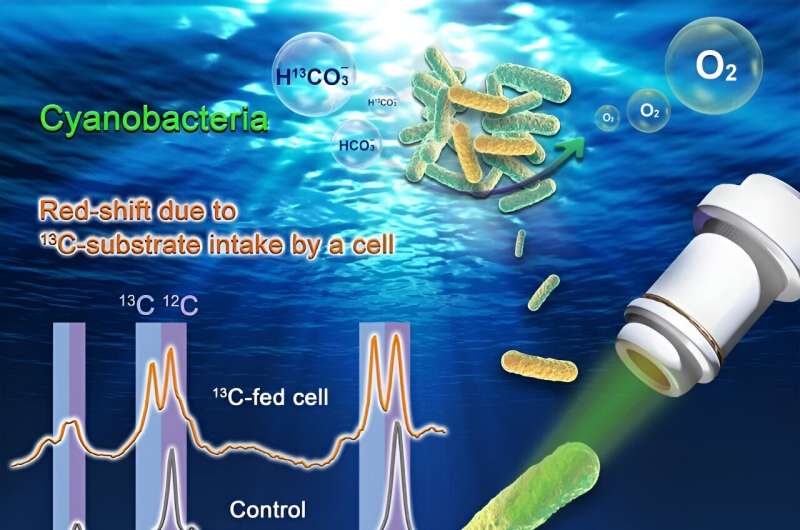This article has been reviewed according to Science X's editorial process and policies. Editors have highlighted the following attributes while ensuring the content's credibility:
fact-checked
trusted source
proofread
Single-cell precision: New screening method greatly accelerates cyanobacterial analysis

Cyanobacteria, as unique photosynthetic prokaryotic organisms, possess the extraordinary ability to directly convert sunlight, seawater, and carbon dioxide into a wide variety of bio-based products.
Currently, the evaluation of cyanobacterial growth rate is mainly based on the time-consuming and labor-intensive monitoring of cell number or biomass accumulation after strain isolation and cultivation, which is a significant bottleneck in the industrial application of cyanobacteria.
Researchers from the Qingdao Institute of Bioenergy and Bioprocess Technology (QIBEBT) of the Chinese Academy of Sciences have developed a revolutionary rapid growth screening method for cyanobacteria, dubbed "iCyanVS."
Using an original Raman-activated cell sorting device (RACS-Seq), this method eliminates the need for cell separation (typically taking about 20 days) and cultivation (usually requiring about five days). Instead, it successfully identifies and isolates engineered cyanobacterial single cells with robust growth in high-salt environments from a mixed mutant library, a process that involves approximately 12 hours of 13C-labeling followed by 10 minutes of measurement.
The results were published in Synthetic and Systems Biotechnology.
Using 13C-labeled single-cell Raman spectra after 12 hours of cultivation with H13CO3-, the researchers accurately measured key metabolic phenotypes, including growth rate and carbon fixation rate, at the single-cell level without the need for cell proliferation.
Integration with RACS-Seq allowed researchers to measure carbon fixation rates and growth rates of 135 cyanobacterial single cells under high-salt conditions in an impressive 10 minutes.
Subsequent use of the all-liquid phase RACS-Seq chip enabled of genotyping of 11 high-performing single cells. The research team identified a genotype associated with the fast growth phenotype, characterized by the overexpression of a key global gene transcription factor, rpoD1.
Furthermore, the researchers found that a mutant strain overexpressing the global gene transcription factor rpoD1 exhibited a 44% higher growth rate than the wild type under high salt conditions.
"Compared with traditional methods requiring 20 days of pure culture and another five days of growth curve monitoring for screening high-growth-rate cyanobacterial mutants, the iCyanVS strategy achieves unprecedented efficiency in screening and genome tracing of key industrial phenotypes," said Prof. Luan Guodong, corresponding author of the study.
"iCyanVS offers a powerful tool for the rapid screening of strains with desirable industrial traits. This innovation holds great promise for the future of cyanobacterial biotechnology and its applications in sustainable bio-based product development," said Prof. Lu Xuefeng, another corresponding author of the study.
"In addition to RACS-Seq, we also integrate the iCyanVS technology into the Flow-mode Raman-activated Cell Sorter (FlowRACS), further streamlining the high-throughput screening of photosynthetic cell factories with rapid growth or high carbon-fixing capability," said Prof. Xu Jian, co-corresponding author of the study.
More information: Jinyu Cui et al, Culture-free identification of fast-growing cyanobacteria cells by Raman-activated gravity-driven encapsulation and sequencing, Synthetic and Systems Biotechnology (2023). DOI: 10.1016/j.synbio.2023.11.001
Provided by Chinese Academy of Sciences



















